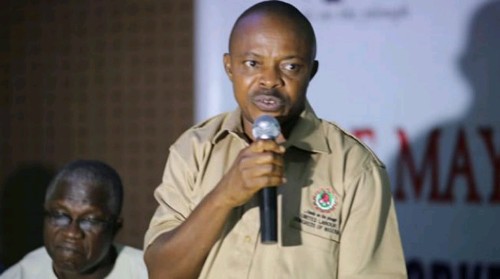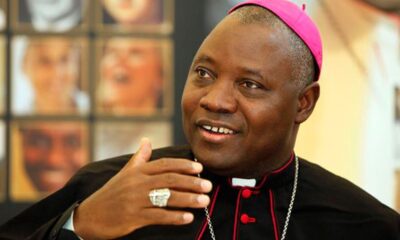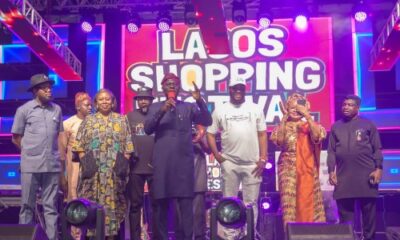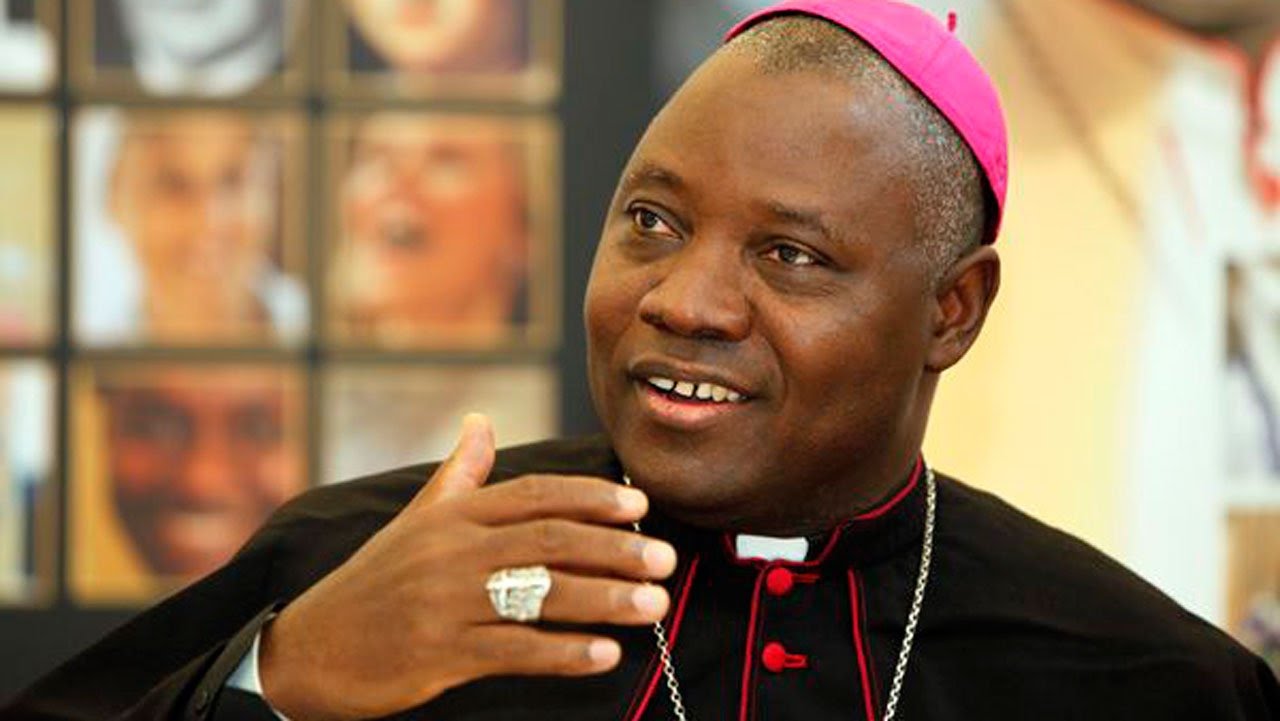The Nigeria Labour Congress’ (NLC) demand for a minimum wage of N1 million has been criticised by the organised business sector, Ekiti, Sokoto, and other states as unrealistic.
In a Monday interview with Arise television, NLC President Joe Ajaero hinted that if the naira’s value kept falling, organised labour may demand N1 million from the federal government during minimum wage talks.
Idris Mohammed, the Minister of Information and National Orientation, responded to the suggestion by stating that the Federal Government will make a rational choice in the best interests of the country and after giving adequate regard to the resources at its disposal and other relevant circumstances.
In the past months, the costs of goods and services had skyrocketed following the removal of the fuel subsidy while the value of the naira had continued to fall due to the forex crisis.
The NLC and Trade Union Congress had earlier pegged their minimum wage demand at N200, 000 but the NLC president in his Monday interview argued that the food inflation and high cost of living had made their previous demand unrealistic.
When asked if the unions’ demand for a living wage could be as high as N1m, Ajaero said, “This N1 million may be relevant if the value of the naira continues to depreciate; if the inflation continues. The demand of Labour is equally dependent on what is happening in society.
“You will remember that by the time we were contemplating N200,000, the exchange rate was about N900. As we talk today, the exchange rate is about N1,400 or even more.
“Those are the issues that determine the demand and it is equally affecting the cost of living and we have always said that our demand will be based on the cost of living index.’’
He added, “You’ll agree with me that a bag of rice is about N60,000 to N70,000. A bag of locally produced corn is about N56,000 or more.’’
He lamented prices of foodstuffs were getting out of reach, adding that the organised Labour would not accept get a minimum wage that would not be enough for transportation even for one week.
Speaking further, the labour leader complained about the failure of the Federal Government to fulfil the agreement signed with the organised Labour last October, noting that it had not faithfully implemented the N35,000 wage award which was to be paid to federal workers for six months.
He stated, “Only one month of the N35,000 naira was paid to civil servants. Also, there is no evidence of payment of any N25,000 paid as palliative to workers. That’s what led to what’s happening in the humanitarian ministry.
“No farmer has come to say that he received fertilizers from the government. I don’t know whether the fertilizers are for sale or cultivation.’’
Speaking on the delay in constituting the minimum wage committee, Ajaero recalled that the old minimum wage will expire by April, noting that the government ought to have set up the negotiation committee six months earlier.
He expressed disappointment that the committee has not commenced sitting.
Responding to the labour’s suggestion, the information minister, Idris, said he would prefer to wait for the final decision of the 37-man minimum wage negotiation committee, which also included the representatives of Organised Labour.
Speaking with one of our correspondents on the phone, Idris said, “It is a proposal but the FG will not pre-empt the work of the 37-man committee that includes labour itself. The FG will do what is right in the interest of the nation as a whole, taking into account our resources and other factors.”
Ekiti State Commissioner for Information, Taiwo Olatunbosun, dismissed as unrealistic the N1m minimum wage suggested by the NLC president.
Olatunbosun, who said that “just as labour has the right to make any demand, the government has the right to negotiate,” advised the unions to set a realistic goal.
The commissioner said, “I know there is a need for planning and I know there is a reason to be realistic too. We all have to be realistic. I don’t think Ekiti can pay N1m per least-paid worker. I don’t think so given the available resources that we have in Ekiti.
“But I know it is not out of place for every segment, every level of government both federal, state, and labour to sit down and discuss.
“Concerning whether Ekiti has the money, well, it is still the same thing that even if they (labour) ask for N1b per the least paid person, the right of negotiation will still be there. I believe that the government will still do the needful by engaging the labour.’’
Olatunbosun said the government is already engaging with the labour at the national level and until the negotiation is concluded, the state government would only wait for the outcome of the parley.
Speaking in the same tone, the Sokoto and Benue State governments advised the labour leadership to present a realistic minimum wage.
The Sokoto State Commissioner for Information, Sambo Danchadi, urged the labour unions to consider other factors in making their demands for a living wage.
“I think they should be realistic, even though in any form of negotiation, you are entitled to make any demand but in the course of negotiation, every party must be realistic.
“I will advise them to be more cautious and realistic, even though it is their right, they still need to be realistic in their demands,” he said.
The Benue State Commissioner of Finance and Budget Planning, Michael Oglegba, acknowledged the pains workers were going through at this period, but stressed that ‘labour leaders must understand there is a limit to what the economy can handle.’
He further said, “The Federal Government negotiates minimum wage for its workforce and the states are allowed to negotiate with their workers anything over and above the minimum wage and this is determined by economic forces.
“We are very much concerned about what workers are going through; the inflation is at an abnormal rate. So, whatever is arrived at by the Federal Government, the states have to negotiate. The point is that whatever the labour may throw is an offer.’’
In a separate interview, the Commissioner for Information, Culture and Tourism, Matthew Abo described Ajaero’s offer as laughable. Abo said, “How can that be possible? N1m minimum wage?’’
The spokesman for the Kebbi State governor, Ahmed Idris, assured the labour leaders of the state’s readiness to engage in fruitful negotiations to determine an acceptable new minimum wage.
“Yes, we all know the N1m wage demand may be difficult but with the current situation, both the labour and the government will have to negotiate based on reality.
“We will engage with them and by God’s grace arrive at a reasonable level where all parties including the government and workers will be happy at the end,” he assured.
The Special Adviser on Media to Ogun State governor, Mr Kayode Akinmade, said the state government was waiting for the report of the minimum wage negotiation committee and would not speak on Ajaero’s comments.
However, the Chairman of the Kwara Council of the NLC, Muritala Olayinka, observed that the N1m wage proposal cannot be paid by the state governments.
Speaking in Ilorin, Olayinka said that none of the 36 states of the federation can sustain the N1m minimum wage for the workers.
He said, “With the current economy in Nigeria where the government is running zero allocation whereby government borrows to pay workers salaries, no states or the Federal Government can sustain the payment of N1m minimum wage for workers.
“What the labour unions can fight for is how the economy can be improved, how the naira can appreciate over the dollar and other currencies.’’
“The labour should put its demand for the minimum wage at N600,000. If the government can fix electricity, improve agricultural production and infrastructure and reduce the costs of transportation, then the minimum wage should be agreed on the rate that the government can pay and sustain.”
The Gombe State Commissioner for Information and Tourism Mijiyanwa Tilde, dismissed the proposal, saying “Government can’t afford that,” adding, “Until the Federal Government implements it, then we will know.”
On her part, the Niger State Commissioner for Information Binta Mamman, expressed shock and surprise over Ajaero’s request wondering if it was reasonable.
“You mean N1m per civil servant. Who is requesting that, Labour? Is that reasonable? An individual, one civil servant, to be paid N1m?” she queried.
Speaking with one of our correspondents, Osun State Commissioner for Information and Public Enlightenment, Kolapo Alimi, said since the wage negotiation was on the exclusive list, the state government would wait for the negotiation to be concluded at the federal level before taking a position.
Also, the President of the Lagos Chamber of Commerce and Industry, Gabriel Idahosa, described the N1m minimum wage demand by the NLC president as unrealistic.
Ajaero’s proposal, he said, was at variance with the current realities of the Nigerian economy.
Idahosa said, “What I heard was that he was proposing a N1m as minimum wage. In this country? They expect a bakery that has about 10 workers to pay N1m? Or a supermarket with 10 workers to pay each of the staff N1m?
“The NLC president seems disconnected from this country. Some of his utterances suggest that he believes playing to the gallery is all it takes to be a good labour leader. If you want to go to a negotiation with a serious intent to arrive at a successful negotiation, you start by making a reasonable request.’’
Speaking further, Idahosa pointed out that Labour’s position on an issue of this nature ought to be based on arduous and painstaking research rather than emotions.
He added, “At some point, they insisted on N200,000 as minimum wage. If they had stayed with that, even though a lot of people thought it was not feasible, it would have been a good tactical position to start from.
“Their demand is not possible. You cannot squeeze water out of stone. When you are targeting a settlement of N1m, then you are not ready for negotiation.’’
The Nigeria Employers Consultative Association and Nigerian Association of Chambers of Commerce Industry Mines and Agriculture said they would review the NLC offer.
The groups admitted that though the N1m minimum wage proposal was a move in the right direction, there was a need to also consider the economic situation before coming up with such a bid.
According to The Punch, the Director General of NECA, Mr Wale Oyerinde, while speaking in Lagos on Monday, urged organised Labour to consider the current economic situation before making the overture.
“You have to stand on something; while it is desirable it is also good. The N1m minimum wage is just perfect but the reality is that it must stand on something.
“The general foundation to stand should be the current economic situation and then the ability of the companies to pay. The reality is, when we get to the negotiation table, what are the parameters for us to arrive at that N1m?
“It must be based on something, it must be based on economic factors. I said NLC has the right to desire N10m as minimum wage. Still, at the end of the day when we get to the negotiation table, they must put those factors like the current economic situation and the needs of enterprises, and in the long run, those are the factors that would shape what the minimum wage should be.” Oyerinde added.
The NECA DG said that the group believes in the strength of social dialogue, adding “No member of the committee would come up with one take it or leave it figure. It is still subject to negotiation.”
According to him, the employers would look at the economic situation, economic environment, issue of forex, interest and inflation rates, all of which the employers are battling with.
‘’We look at all those figures and say this is how much employers can pay. So, without negotiations at the rate, everything is at the committee level and not outside the committee level. Since the committee has been inaugurated, all negotiations should be done at that level,” he counselled.
Also speaking on the issue, the National President, Nigerian Association of Chambers of Commerce, Industry, Mines and Agriculture, Dele Oye, emphasised the importance of following due process and ensuring that all discussions around the adjustment of the minimum wage were based on a comprehensive understanding of the facts and implications.
Oye said it would be premature and unfair for NACCIMA or any other member of the recently constituted 37-man Committee to join issues with the NLC president or engage in public debates on the matter without first having the opportunity to review the facts and basis of the proposed N1m minimum wage.
He said that NACCIMA is committed to working with the Federal Government and other stakeholders to ensure a fair minimum wage is established.
Oye noted, “We encourage all parties involved to approach this issue with a spirit of cooperation and constructive dialogue. NACCIMA is committed to working alongside the NLC, the Federal Government, and other stakeholders to ensure that a fair and sustainable wage structure is established, one that reflects the economic realities of our nation and the welfare of our workforce.
“In anticipation of the committee’s discussions, NACCIMA appeals to all parties to exercise patience and to prepare for negotiations that are founded on empirical data, economic analysis, and the shared goal of economic stability and prosperity for all Nigerians.”
Oye called for calm pending the meeting of the committee.
Credit: The Punch


 BIG STORY2 days ago
BIG STORY2 days ago
 BIG STORY2 days ago
BIG STORY2 days ago
 BIG STORY3 days ago
BIG STORY3 days ago
 BIG STORY2 days ago
BIG STORY2 days ago
 BIG STORY3 days ago
BIG STORY3 days ago
 BIG STORY3 days ago
BIG STORY3 days ago
 BIG STORY2 days ago
BIG STORY2 days ago
 BIG STORY3 days ago
BIG STORY3 days ago




















